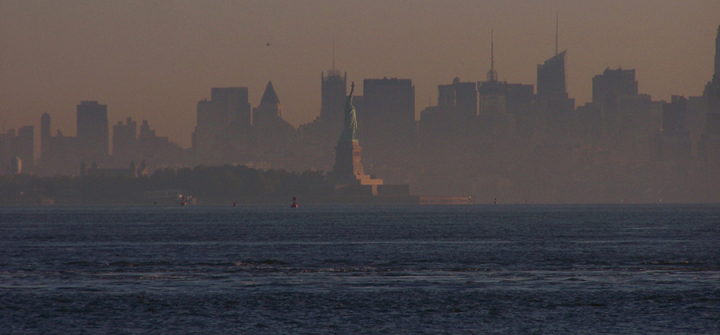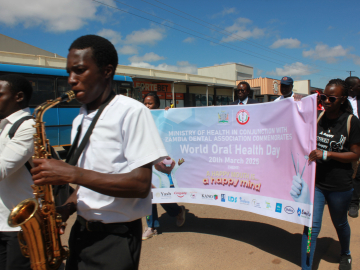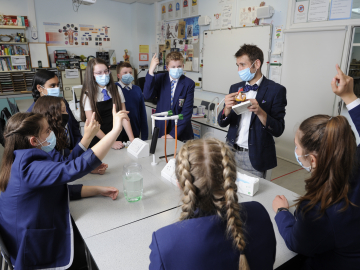EPA Budget Cut’s Impact on Health: A Q&A with Tom Burke
President Trump’s proposed budget unveiled yesterday signals a major change to government’s approach to environmental health. His recommended 30% cut to the US Environmental Protection Agency would mean the loss of 3,200 positions and dozens of programs. While the proposed budget will not likely be adopted as is by the House and Senate, the recommended cuts have ignited a strong defense of environmental and public health programs. To put the issues in context, Global Health NOW turned to Tom Burke, who served as EPA science advisor and deputy assistant administrator until January of this year. Burke, who has since returned to the Johns Hopkins Bloomberg School of Public Health as a professor of Health Policy and Management, shares his insights into the likely effects of the proposed budget cuts, the EPA’s role in public health and responses to the proposal.
President Trump unveiled his budget recommendations on March 16, including a proposed 30% cut to the EPA. What will be the biggest loss if the proposed drastic cuts to the EPA budget go through?
If we cut off the most preeminent, important research organization and supporter of research in environmental public health, we lose our ability as a nation to be effective in core functions in environmental health. It’s about understanding exposure, the long-term health effects of exposures in the environment. The losses to the global scientific community are really unimaginable.
To go back—let’s imagine life before the EPA. I would like everyone to look at a piece of the sky in New York City in Thanksgiving of 1966, the great air inversion, and think about just how far we’ve come in protecting public health, reducing cancer risk, risks to our elderly and youngest and improving quality of life, and understanding the incredibly important connection between our environment and our health. To turn back the clock on that—for someone who has given his life to these issues—is unthinkable.
You and colleagues Jon Samet and Bernard Goldstein wrote a NEJM commentary March 1 making the case for environmental health and the EPA’s role in preserving public health. Did it have any effect?
We certainly hope so. We need to get the word the out to the broader public health and medical community. And what better forum than the New England Journal of Medicine. It’s really had a tremendous reach. I’ve had comments from people in Europe, staffers on Capitol Hill, and calls from reporters at major news outlets. I think those kinds of things present the argument for making sure we preserve the scientific process and support the scientific enterprise that’s so essential to our decision making. We tried to emphasize that science doesn’t change and it’s nonpartisan. We have to go with the evidence and the very strong evidence on so many public health issues shows that we need to heed it.
Is there any silver lining to the proposed cuts to EPA and other agencies?
The silver lining is I think we’ve awakened a whole new generation of folks to just how fragile our environment is and how important it is to have that assurance we are protecting our natural resources. This is a wake up call for public health and the scientific community. And I think the message has been well received, but we’ve got work to do.
Maybe you have to be an old guy like me to understand that public health and particularly environmental health is a roller coaster ride, that there is a pendulum that swings back and forth between stakeholders and more anti-regulatory forces being in control. For the most part we strike a balance. You can’t have healthy communities without a healthy environment. And frankly you can’t have a healthy economy without a healthy environment either.
What do you hear from colleagues who are currently at EPA? How worried are they?
First of all, I have to say I have a hands off approach to that. I’ve served in a very senior capacity at EPA, and I respect the changes in leadership with the new administration. But I am very concerned about people in junior positons, postdocs and leaders of the future. I’m very concerned about the brain drain. It will be tremendously difficult to rebuild. It took a long time to rebuild agencies after Reagan’s cut backs.
This is a time of considerable mistrust of government and regulations. How would you make the case for environmental regulations to those who are opposed?
First of all, the evidence is very clear. The EPA does not stifle jobs. Just look at the economic recovery. The Obama administration in the last 8 years was devastating for jobs? Not true. There’s been a tremendous recovery [in job numbers]. Some of the most booming industries in the world are related to the environment in the renewable energy sector. The auto industry has has tremendously recovered since 2008. If you look systematically at the accusation of job-killing regulations, it just doesn’t hold water.
What’s your advice to people as the budget process and the possible effects on EPA and other agencies unfold?
I would just hope that people would understand what environmental protection is to their personal lives. When you wake up in the morning and brush your teeth and flush the toilet, no one gives a thought of the incredible infrastructure. You can trust your environment now, and for most of us, it is something we don’t think about.
I think recently we’ve learned just how fragile that is. My own experience in Flint, Michigan [and elsewhere] is that when you lose that confidence, it is incredibly difficult to regain. We in the public health community have to think about how we can engage in the process and make our voices heard.
Join the thousands of subscribers who rely on Global Health NOW summaries and exclusive articles for the latest public health news. Sign up for our free weekday enewsletter, and please share the link with friends and colleagues: Subscribe to GHN
Smog in NYC. Flickr/Charles Smith/Creative Commons License





